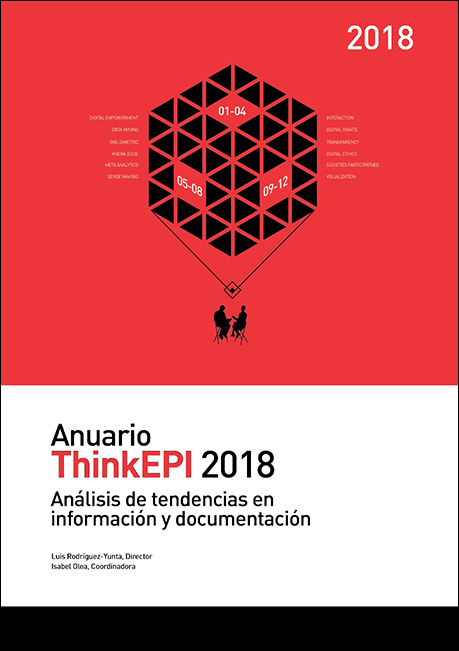Hacia una base teórica social de la ciencia de la información
DOI:
https://doi.org/10.3145/thinkepi.2018.07Palabras clave:
Ciencia de la información, Interdisciplinariedad, Teoría, Epistemología social, Filosofía de la información, Datos masivos.Resumen
Se discute el carácter científico de la ciencia de la información y sus relaciones interdisciplinares con otras áreas. Se revisan algunas de las propuestas y posiciones teóricas que coexisten, muchas veces en conflicto, en la construcción histórica de la interdisciplina, entre ellas la teoría matemática de la comunicación, la epistemología social, la filosofía de la información de Floridi y las posiciones ateóricas en áreas como la ciencia de la información tecnicista, la recuperación de la información, la bibliometría y datos masivos (big data). Se concluye que el proyecto teórico de epistemología social, tanto en su concepción original de Egan y Shera, como en sus actuales manifestaciones en la filosofía de Steve Fuller y el paradigma de análisis de dominio de Hjí¸rland, es una de las propuestas más serias para proporcionar una base teórica social a la ciencia de la información.
Citas
Anderson, Chris (2008). "The end of theory: The data deluge makes the scientific method obsolete". Wired, 32 junio. https://www.wired.com/2008/06/pb-theory
Buckland, Michael K. (2005). "The philosophy of information". Journal of documentation, v. 61, n. 5, pp. 684-686. https://doi.org/10.1108/00220410510625921
Busha, Charles H.; Harter, Stephen P. (1980). Research methods in librarianship: techniques and interpretation. New York: Academic Press. ISBN: 978 0121475505
Butler, Pierce (1933). An introduction to library science. Chicago: University of Chicago Press. https://archive.org/details/introductiontoli011501mbp
Cronin, Blaise (2004). "Pierce Butler´s an introduction to library science: A tract for our times? A review article". Journal of librarianship and information science, v. 36, n. 4, pp. 183-188. https://doi.org/10.1177/0961000604050571
Cronin, Blaise (2008). "The sociological turn in information science". Journal of information science, v. 34, n. 4, pp. 465-475. https://doi.org/10.1177/0165551508088944
Dias, Eduardo-Wense (2000). "Biblioteconomia e ciíªncia da informaí§í£o: natureza e relaí§íµes". Perspectivas em ciíªncia da informaí§í£o, v. 5, n. especial, pp. 67-80. https://goo.gl/mHUuHS
Elías-Pérez, Carlos (2015). Big data y periodismo en la sociedad red. Madrid: Sintesis. ISBN: ISBN: 978 84 90777398
Floridi, Luciano (2002). "On defining library and information science as applied philosophy of information". Social epistemology, v. 16, n. 1, pp. 37-49. https://doi.org/10.1080/02691720210132789
Floridi, Luciano (2004). "Afterword LIS as applied philosophy of information: A reappraisal". Library trends, v. 52, n. 3, pp. 4799-4805. https://www.ideals.illinois.edu/handle/2142/1682
Fuller, Steve (2010). "Social epistemology". En: Encyclopedia of library and information sciences, Third Edition, v. 6, pp. 4799-4805.
García-Marco, Francisco-Javier (2011). "Psicología y sociología de la información: una necesidad práctica y teórica". El profesional de la información, v. 20, n. 1, pp. 5-9. https://doi.org/10.3145/epi.2011.ene.01
Grossman, Hal B. (2010). ""˜Without reserve´: Jesse Shera in the Wilson Library Bulletin and elsewhere, 1961-1970". Library & information history, v. 26, n. 2, pp. 152-169. https://doi.org/10.1179/175834910X12651250207957
Hjí¸rland, Birger (2002). "Domain analysis in information science: Eleven approaches traditional as well as innovative". Journal of Documentation, v. 58, n. 4, pp. 422-462. https://doi.org/10.1108/00220410210431136
Hjí¸rland, Birger (2013). "Theories of knowledge organization"”theories of knowledge". Knowledge organization, v. 40, n. 3, pp. 169-181. https://goo.gl/omPqEQ
Hjí¸rland, Birger (2015). "Theories are knowledge organizing systems (KOS)". Knowledge organization, v. 42, n. 2, pp. 113-128. https://goo.gl/CDxd2g
Hjí¸rland, Birger (2016a). "The paradox of atheoretical classification". Knowledge organization, v. 43, n. 5, pp. 313-323. https://goo.gl/bsEmhF
Hjí¸rland, Birger (2016b). "Informetrics needs a foundation in the theory of science". En: Sugimoto, Cassidy R. (ed.). Theories of informetrics and scholarly communication. Berlin: De Gruyter, pp. 20-46. ISBN: 978 3 11 030846 4 https://goo.gl/TLGZK5
Hjí¸rland, Birger (2017a). "Library and information science (LIS)". En: ISKO Encyclopedia of knowledge organization. http://www.isko.org/cyclo/lis
Hjí¸rland, Birger (2017b). "Domain analysis". Knowledge Organization, v. 44, n. 6, pp. 436-464.
También publicado en: ISKO Encyclopedia of knowledge organization. http://www.isko.org/cyclo/domain_analysis
Ibekwe-SanJuan, Fidelia; Bowker, Geoffrey C. (2017). "Implications of big data for knowledge organization". Knowledge organization, v. 44, n. 3, pp. 187-198. https://hal.archives-ouvertes.fr/hal-01489030/document
Lyotard, Jean-François (1984). The postmodern condition: A report on knowledge. Minneapolis: University of Minnesota Press. ISBN: 0 8166 1166 1 https://goo.gl/X1tKYf
Martínez-Ávila, Daniel; Guimarí£es, José Augusto (2015). "La construcción de la biblioteconomía como ciencia y su relación con la clasificación". En: XII Congreso ISKO España y II Congreso ISKO España-Portugal, 19-20 de noviembre, Organización del conocimiento para sistemas de información abiertos. Murcia: Universidad de Murcia. https://goo.gl/BWyh8G
Martínez-Ávila, Daniel; Zandonade, Tarcisio (2017). "Social epistemology: Still the best framework for LIS?" En: Social epistemology as theoretical foundation for information science: supporting a cultural turn 16-17 August 2017. Copenhagen: Royal School of Library and Information Science.
Mayer-Schönberger, Viktor; Cukier, Kenneth (2013). Big data: A revolution that will transform how we live, work, and think. New York: Houghton Mifflin Harcourt. ISBN: 978 0544227750
Raymond, Eric (2017). "The brain is a Peirce engine". Armed and Dangerous: Sex, software, politics, and firearms. Life´s simple pleasures"¦, 11 septiembre. http://esr.ibiblio.org/?p=7651
Robertson, Stephen (2000). "Salton award lecture. On theoretical arguments in information retrieval". ACM SIGIR Forum, v. 34, n. 1, pp. 1-10.
http://sigir.org/files/forum/S2000/salton_lecture.pdf
Saracevic, Tefko (1995). "Interdisciplinary nature of information science". Ciíªncia da informaí§í£o, v. 24, n. 1. https://goo.gl/soLpCo
Shannon, Claude E. (1948). "A mathematical theory of communication". The bell system technical journal, v. 27, n. 3, pp. 379-423, 623-656.
http://affect-reason-utility.com/1301/4/shannon1948.pdf
Shannon, Claude E.; Weaver, Warren (1949). The mathematical theory of communication. Urbana: University of Illinois Press. http://www.magmamater.cl/MatheComm.pdf
Shera, Jesse-Hauk (1968). "An epistemological foundation for library science". En: Montgomery, Edward, B. (ed.). The foundations of access to knowledge: A symposium. Syracuse, NY: Syracuse University Press, pp. 7-25.
Small, Henry (2016). "Referencing as Cooperation or Competition." En: Sugimoto, Cassidy R. (ed.). Theories of informetrics and scholarly communication. Berlin: De Gruyter, pp. 49-71. ISBN: 978 3 11 030846 4
Spang-Hanssen, Henning (2001). "How to teach about information as related to documentation". Human IT, v. 5, n. 1, pp. 125-143. https://humanit.hb.se/article/view/168
Zwadlo, Jim (1997). "We don´t need a philosophy of library and information science: We´re confused enough already". The library quarterly, v. 67, n. 2, pp. 103-121. https://doi.org/10.1086/629928


